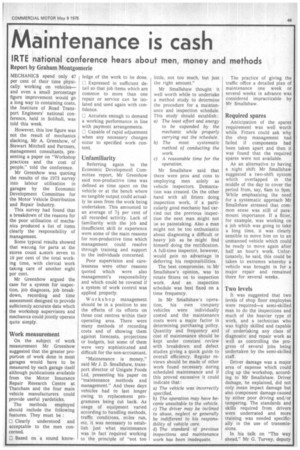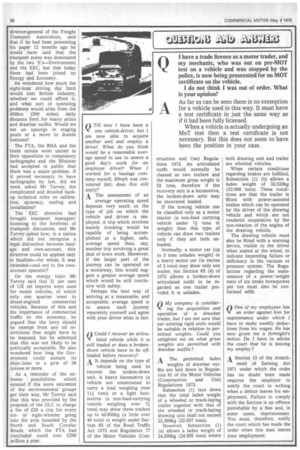Maintenance is cash
Page 39

Page 40

If you've noticed an error in this article please click here to report it so we can fix it.
IRTE national conference hears about men, money and methods
Report by Graham Montgomerie
MECHANICS spend only 47 per cent of their time physically working on vehicles— and even a small percentage figure improvement would go a long way to containing costs, the Institute of Road Transport Engineers' national conference, held in Solihull, was told this week.
However, this low figure was not the result of mechanics slacking, Mr A. Greenhow, of Stewart Mitchell and Partners, management consultants, presenting a paper on "Workshop practices and the cost of people," told the conference.
Mr Greenhow was quoting the results of the 1973 survey into labour utilisation in garages by the Economic Development Committee for the Motor Vehicle Distribution and Repair Industry.
This survey had found that a breakdown of the reasons for the poor utilisation of mechanics produced a list of items clearly the responsibility of management.
Some typical results showed that waiting for parts at the stores could aosorb seven to 10 per cent of the total working time, with clerical work taking care of another eight per cent.
Mr Greenhow argued the case for a system for inspection, job diagnosis, job breakdown, recording and time assessment designed to provide sufficiently accurate data which the workshop supervisors and mechanics could jointly operate quite simply.
Work measurement
On the subject of work measurement Mr Greenhow suggested that the greater proportion of work done in most garages would have to be measured by each garage itself although publications available from the Motor Insurance Repair Research Centre at Thatcham and the four main vehicle manufacturers could provide useful yardsticks.
The methods employed should include the following features. They must be : Li Clearly understood and acceptable to the men concerned.
E Based on a sound know ledge of the work to be done.
TI Expressed in sufficient detail so that job items which are common to more than one repair or service can be isolated and used again with confidence.
C. Accurate enough to demand a working performance in line with payment arrangements.
17] Capable of rapid adjustment when any necessary changes occur to specified work content.
Unfamiliarity
Referring again to the Economic Development Committee report, Mr Greenhow said non-productive time was defined as time spent on the vehicle or at the bench where no tangible output could actually be seen from the work being undertaken. This amounted to an average of 7i per cent of all recorded activity. Lack of familiarity with the job and insufficient skill or experience were some of the main reasons for non-productive time which management could resolve through training and support to the individuals concerned.
Poor supervision and carelessness were other reasons quoted which were also management's responsibility and which could be covered if a system of work control was applied properly.
Workshop management should be in a position to see the effects of its efforts on those cost centres within their operating area, There were many methods of recording costs and of showing them against forecasts, projections or budgets, but some of them were very sophisticated and difficult for the non-accountant.
"Maintenance is money," said Mr J. D. Smallshaw, transport director of Unigate Foods Ltd, presenting his paper on "maintenance methods and management." And these days vehicles had to last longer owing to replacement programmes being cut back. As usage of equipment varied according to handling methods, traffic conditions, miles run, etc, it was necessary to establish just what maintenance was in fact -required working to the principle of "not too
little, not too much, but just the right amount."
Mr Smallshaw thought it well worth while to undertake a method study to determine the procedure for a maintenance and inspection schedule. This study should establish : a) The least effort and energy to be expended by the mechanic while properly carrying out the schedule.
b) The most systematic method of conducting the work.
c) A reasonable time for the operation.
Mr Smallshaw said that there were pros and cons to employing men solely as vehicle inspectors. Demarcation was created. On the other hand with all fitters doing inspection work, if a particularly good mechanic had carried out the previous inspection the next man might not -oe so painstaking. Also a man might not be too enthusiastic about diagnosing a difficult or heavy job as he might find himself doing the rectification. A full-time inspector, however, would gain no advantage in deferring his responsibilities.
The best compromise, in Mr Smallshaw's opinion, was to rotate fitters on to inspection work. And an inspection schedule was best fixed on a time frequency.
In Mr Sniallshaw's operation, his own company vehicles were individually costed and the maintenance costs were a major factor in determining purchasing policy. Quantity and frequency and cost of maintenance should be kept under constant review with breakdown and defect studies giving a quick guide to overall efficiency. Regular reviews should be made of other work found necessary during scheduled maintenance and if this proved excessive it could indicate that : a) The vehicle was incorrectly specified.
b) The operation may have become unsuitable to the vehicle.
c) The driver may be inclined to abuse, neglect or generally be indifferent to his responsibility of vehicle care.
d) The standard of previous inspections and maintenance work has been inadequate. The practice of giving the traffic office a detailed plan of maintenance one week or several weeks in advance was considered impracticable by Mr Smallshaw.
Required spares
Anticipation of the spares requirement was well worth while. Fitters could ask why the shop management had failed if components had been taken apart and then it was found that the required spares were not available.
As an alternative to having a night shift Mr Smallshaw suggested a two-shift system which overlapped in the middle of the day to cover the period from, say, 6am to 9pm. While emphasising the need for a systematic approach Mr Smallshaw stressed that common sense was still of paramount importance. If a fitter, for example, was working on a job which was going to take a long time, it was clearly sensible to move him on to an unmanned vehicle which could be ready to move again after half an hour's work. Unfortunately, he said, this could be taken to extremes whereby a vehicle was brought in for a major repair and remained there for several weeks.
Two levels
It was suggested that two levels of shop floor employees were required—a semi-skilled man to do the inspections and much of the heavier type of work, and a technician who was highly skilled and capable of undertaking any class of diagnostic and repair work as well as controlling the progress of several jobs being undertaken by the semi-skilled staff.
Driver damage was a major area of expense which could clog up the workshop, according to Mr Smallshaw. Driver damage, he explained, did not only mean impact damage but also component damage caused by either poor driving and/or tampering. The standards and skills required from drivers were underrated and more training was needed specifically in the use of transmissions.
In his talk on "The way ahead," Mr G. Turvey, deputy director-general of the Freight Transport Association, said that if he had been presenting his paper 12 months ago he would have said that the transport scene was dominated by the two 'E's—Environment and the EEC, but that today these had been joined by Energy and Economy.
He wondered how much the eight-hour driving day limit would cost British industry, whether we could afford it, and what sort of operating problems would arise from the 450km (280 miles) daily distance limit for heavy artics and drawbar outfits. Would we see an upsurge in staging posts or a move to double bottoms?
The FTA, the RHA and the trade unions were united in their opposition to compulsory tachographs and the Minister had accepted in public that there was a major problem. If it proved necessary to have tachographs by law, did we need, asked Mr Turvey, the complicated and detailed backup technical rules on calibration, accuracy, sealing and installation?
The EEC directive had brought transport managers' licensing to the forefront of transport discussion, and Mr Turvey asked how, in a nation which did not recognise a legal distinction between haulage and own-account, this directive could be applied only to hauliers—for whom it was intended—and not to the ownaccount operator?
On the energy topic Mr Turvey said that 21 per cent of UK oil. imports were used for motor vehicles, of which only one quarter went to diesel-engined commercial vehicles. Because of this and the importance of commercial traffic to the economy, he argued that the lorry should be exempt from any oil restrictions that might have to be imposed, but he admitted that this was not likely to be politically acceptable. He also wondered how long the Government could sustain its objec lions to a gvw of 38 tonnes or more.
As a reminder of the ex treme possibilities which existed if the more extremist of the environmental groups got their way, Mr Turvey said that this was provided by the proposal of the GLC to charge a fee of £30 a trip for every sixor eight-wheeler going into the area bounded by the North and South Circular Roads, which the FTA had concluded could cost £200 million a year.




























































































































































